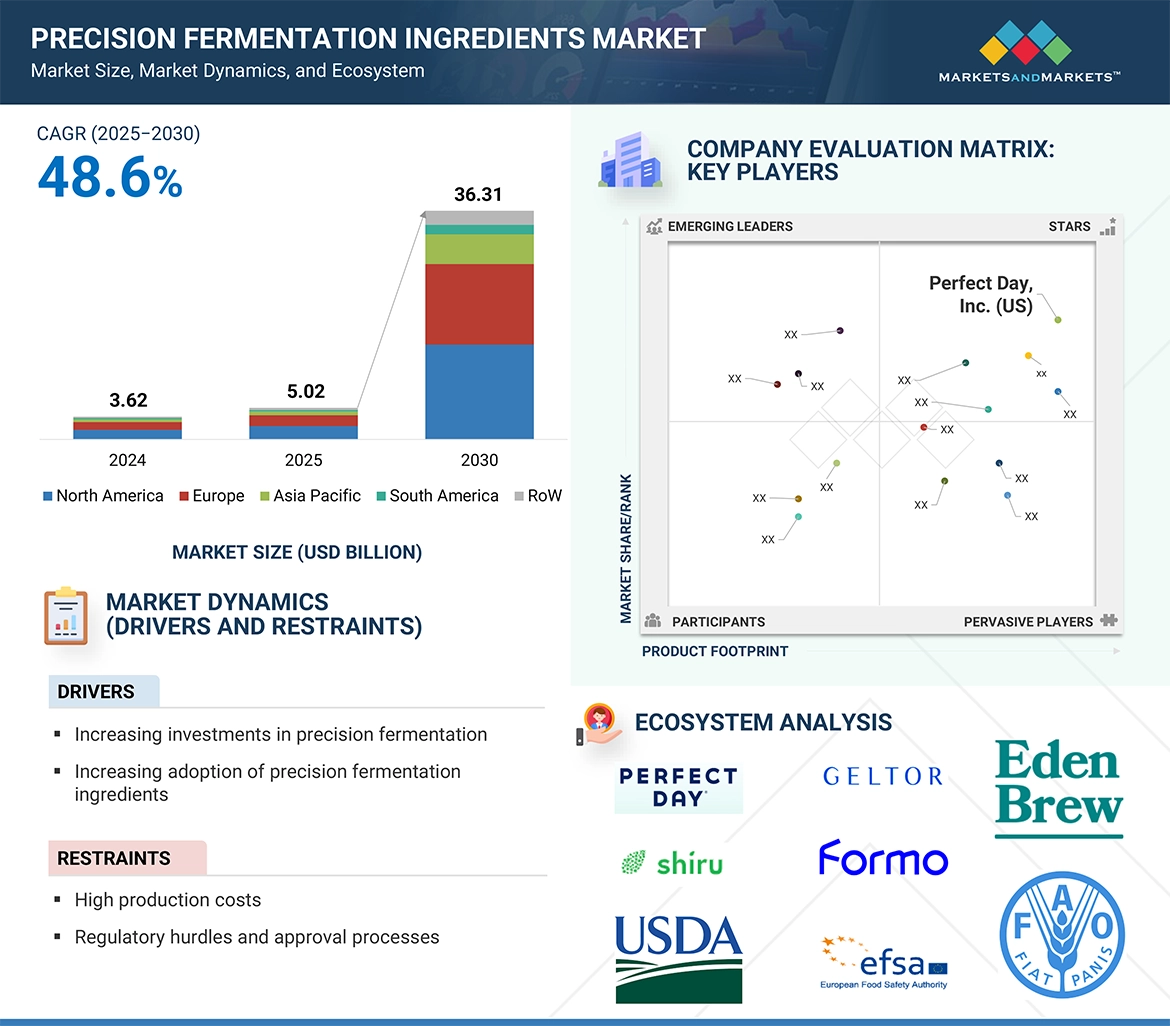The precision fermentation ingredients market is estimated to be USD 5.02 billion in 2025 and is projected to reach USD 36.31 billion by 2030, at a CAGR of 48.6% from 2025 to 2030. The precision fermentation ingredients market is one of the most dynamic frontiers in food technology, biotech, and sustainability. Precision fermentation harnesses the power of genetically engineered microorganisms (like yeast, bacteria, or fungi) to create high-value ingredients—such as proteins, enzymes, vitamins, and bioactives—matching or outperforming animal or plant-derived equivalents in taste, functionality, and sustainability.

What is precision fermentation?
Precision fermentation is a cutting-edge biotechnology process where microorganisms—such as yeast, fungi, or bacteria—are programmed to produce specific high-value ingredients. Unlike traditional fermentation, which focuses on transforming food through natural microbial action, precision fermentation is designed to create precise proteins, enzymes, flavor compounds, or other molecules, mirroring or surpassing what’s found in nature. This innovation is central to the development of animal-free dairy proteins, egg whites, specialty enzymes, and even certain vitamins for food, cosmetics, and pharmaceuticals.
Precision Fermentation Ingredients Market Growth Drivers
- Demand for Sustainable, Animal-Free Ingredients: Growing concerns over the environmental footprint of traditional animal agriculture and a shift towards plant-based and vegan diets are major growth drivers.
- Food Security and Population Growth: As the global population approaches 10 billion by 2050, precision fermentation is seen as essential in creating scalable, resilient, and ethical food systems.
- Advances in Synthetic Biology: Innovations in microbial strain engineering, fermentation process optimization, and downstream processing are improving the cost-effectiveness and scalability of these ingredients.
- Supportive Regulatory and Investment Environment: Governments are increasingly promoting sustainable food production, with significant venture capital investments pouring into food tech startups and established biotech firms.
- Customization and Clean Label Trends: Precision fermentation enables the creation of tailor-made functional ingredients for “clean label” products, catering to consumer expectations for transparency and health.
Major Applications
- Food & Beverage: Alternative dairy proteins (like casein and whey), egg substitutes, meat analogs, flavors, and even next-generation sweeteners.
- Nutraceuticals, Cosmetics, and Pharmaceuticals: For producing rare enzymes, vitamins, bio-actives (like collagen), and specialty proteins.
Download PDF Brochure: https://www.marketsandmarkets.com/pdfdownloadNew.asp?id=30824914
Precision Fermentation Ingredients Market Trends
- Alternative Proteins Dominate: Alternative proteins (casein, whey, collagen, heme protein, and egg white) constitute a fast-growing market segment due to their use in formulating animal-free food products with authentic taste and texture.
- Yeast as a Microbe of Choice: Yeast holds over 34% of the market share in the microbe segment because of its versatility, scalability, and ability to produce a variety of valuable compounds.
- Innovation in Multiple Industries: While food and beverages lead in uptake, pharmaceuticals, cosmetics, and agriculture are increasingly adopting precision-fermentation-derived ingredients for specialty applications ranging from therapeutics to cosmetic peptides.
- Cost Reduction and Scalability: Continuous technology refinement is driving down production costs, making precision fermentation ingredients competitive with conventional animal- or plant-derived counterparts.
Top 10 Companies in the Precision Fermentation Ingredients Market
- Perfect Day, Inc. (US)
- Geltor (US)
- The EVERY Company (US)
- Impossible Foods Inc. (US)
- ImaginDairy Ltd. (Israel)
- Shiru, Inc. (US)
- FORMO FOODS GMBH (Germany)
- EDEN BREW (Australia)
- Change Foods (US)
- New Culture (US)
Challenges and Opportunities
- High Production Costs: At present, producing precision-fermented ingredients—especially animal-free proteins—remains expensive due to specialized equipment, costly substrates, and complex processing (sometimes accounting for up to 60% of total costs). Most products are still priced higher than their traditional counterparts.
- Scaling Up: Achieving cost-competitiveness at commercial volumes requires breakthroughs in process yield, scale, and supply chain efficiency.
- Consumer Acceptance & Regulation: Some consumers remain skeptical about genetically modified organisms (GMOs), and regulatory frameworks vary globally, often slowing down market entry.
- Innovation Race: Companies are investing in R&D to create novel proteins and ingredients, optimize strains, and improve resource use, pivotal for staying competitive and supporting sustainability.
Request for Sample Pages: https://www.marketsandmarkets.com/requestsampleNew.asp?id=30824914
The Future Outlook
As consumer pressure for ethical, sustainable, and functional food and ingredient options builds, precision fermentation is positioned as a transformative solution that addresses food security, resource conservation, and nutrition. Significant R&D and regulatory support—not to mention continued investor enthusiasm—will fuel sustained growth and new product innovations, reshaping ingredient supply chains and menus worldwide.
